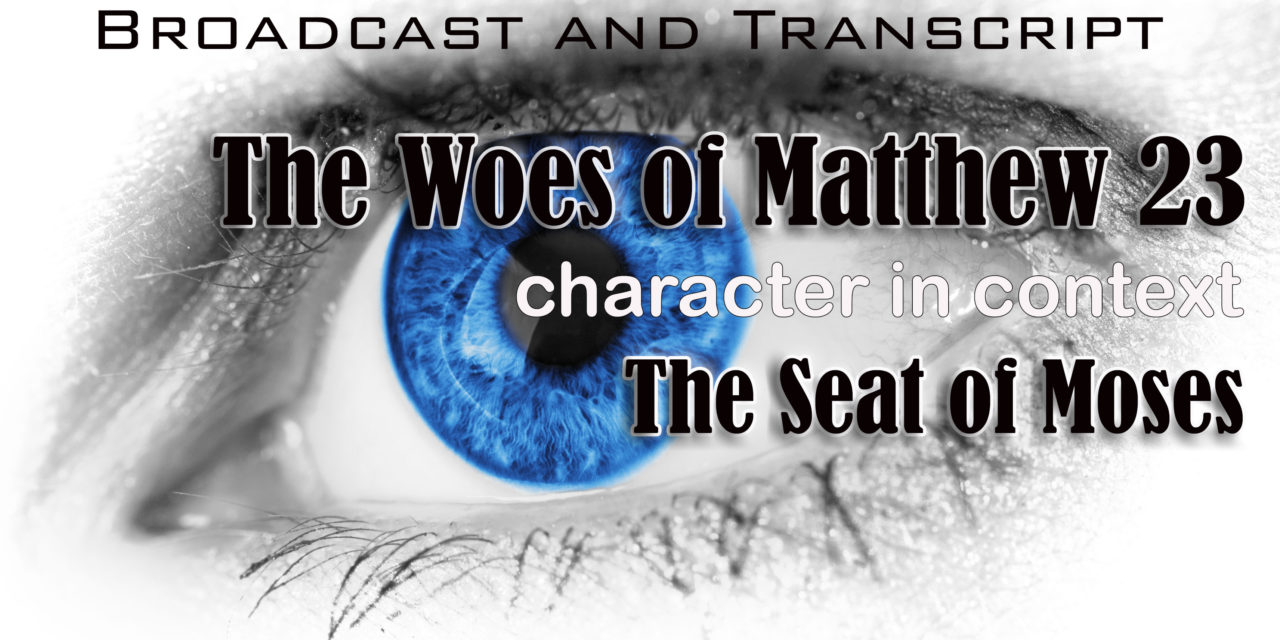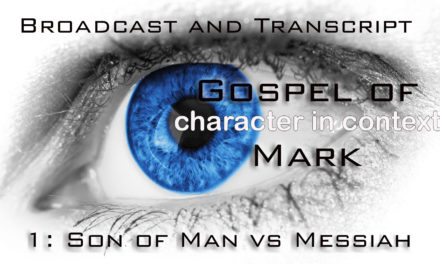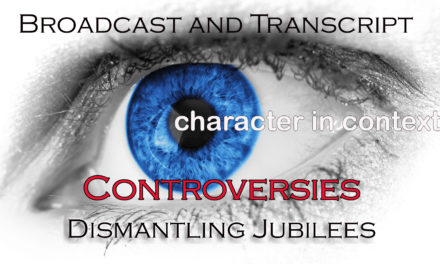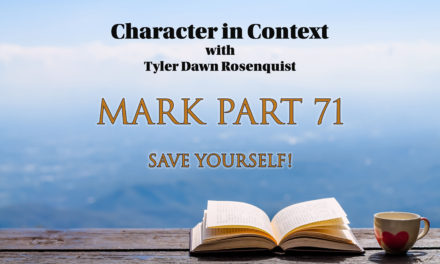Hopefully you caught last week’s episode on polemic in the ancient world and if you didn’t go back and listen because it will be important to understanding this teaching. I will only barely review that material here. This week I am going to tip some popular sacred cows within the Hebrew Roots movement as to the identification of Moses’s seat, whether or not Yeshua/Jesus was wearing a tallit, and if Rabbis existed then as we know them today. And most importantly, was Yeshua really outlawing titles or was there something else going on in the first century? You have to listen in order to find out.
***********
Transcript–not polished or particularly edited, but here it is:
Then Jesus said to the crowds and to his disciples, 2 “The scribes and the Pharisees sit on Moses’ seat, 3 so do and observe whatever they tell you, but not the works they do. For they preach, but do not practice.4 They tie up heavy burdens, hard to bear, and lay them on people’s shoulders, but they themselves are not willing to move them with their finger. 5 They do all their deeds to be seen by others. For they make their phylacteries broad and their fringes long, 6 and they love the place of honor at feasts and the best seats in the synagogues 7 and greetings in the marketplaces and being called rabbi by others. 8 But you are not to be called rabbi, for you have one teacher, and you are all brothers. 9 And call no man your father on earth, for you have one Father, who is in heaven. 10 Neither be called instructors, for you have one instructor, the Christ. 11 The greatest among you shall be your servant. 12 Whoever exalts himself will be humbled, and whoever humbles himself will be exalted.
If you listened to last week’s teaching on the purpose of polemic in the Greco-Roman world, then you are already acquainted with the function of insults between differing schools of philosophical thought in the ancient world—philosophy in those days meaning a desire to leave behind vice and pursue virtue, to become morally healthy. I know, shocking right? That isn’t what it means today, oftentimes. The problem was, that there were different schools of thought and each thought themselves to be the one true way. In pursuit of supremacy, they practiced the art of the polemic—which can be described as “Hellenistic insult.” Josephus described the different factions within Judaism in his day as competing philosophies—Pharisee, Sadducee, Essene—competing for the hearts and minds of the populace. Polemic was a way of exalting oneself, one’s philosophical bent, one’s school of thought, as supreme while labeling the other schools as morally deviant. No one was better at this than the Essenes, who saw anyone who was not an Essene, whether Jew or Gentile, as reprobates and even cursed them as part of their daily rituals.
Hi, I’m Tyler Dawn Rosenquist and welcome to Character in Context, where we explore the historical context of Scripture and talk about how it bears on our own behavior and witness as image-bearers. You can find my teachings on my websites theancientbridge.com and contextforkids.com as well as on my youtube channels, accessible from my websites. You can also access past broadcasts on my podcast channel characterincontext.podbean.com and my context books for adults and families are available through amazon.com.
So we have a lot of interesting little mentions in this week’s section of Scripture, taken from Matthew 23. Moses’s seat, phylacteries (some versions say tefillin), tassels (or tzitzit), rabbis, fathers, instructors, etc…so what did all this mean to Yeshua’s/Jesus’s Jewish audience?
Word of warning—I might be stepping on some toes this week because we have a few anachronisms that we tend to read into the text. Anachronisms are references that are out of place and/or out of time. For example, reading homosexuality into an 1890’s era story about the “Gay 90’s” would be an anachronism. Gay didn’t mean that way back then. Just like a mouse wouldn’t have any technological connotations in Hickory Dickory Dock. Because certain words mean certain things now, we tend to assume that they always did and that is natural—sometimes we just need to unlearn some stuff. No big deal. We aren’t first century people, much less first-century Jews. Modern Judaism looks little like the Judaism of Yeshua’s time. Modern Judaism is largely based upon the philosophical teachings of a 12th-century scholar named Maimonides. So we’re going to clean up some misunderstandings before we actually dive into what Yeshua was saying here.
First of all—Moses’s seat. I know that there are a lot of teachings out there that definitively state that it was this or that, but the truth is that we just don’t know exactly what it was. Yes, there is an ornate stone “chair” that has been found in several ancient synagogues, but there is quite a bit of scholarly debate as to whether it is even a chair or not, or perhaps a bema (the stand on which a Torah Scroll is placed for reading). There is no documentation anywhere describing one, and so what we have are a lot of opinions. Some folks take these opinions and speak about them as though they are an established truth, but the truth is that we just don’t know for sure. Was it this stone chair-ish thing, or was it figuratively speaking of the authority of the Pharisees and Scribes in setting and enforcing their legal enactments based on Torah? The evidence is sadly inconclusive.
Second—the heavy burdens, aka the traditions of the elders, aka the Oral Torah. It wasn’t in written form yet—that wouldn’t happen until the compilation of the Mishnah by around 200 CE. The Mishnah can be thought of as like the legal rulings of the Supreme Court, the final decisions of case law. It makes up half of what is known as the Talmud. The rest of the Talmud is called the Gemara, and contains all the legal debates—as such it is very long and arduous to go through. Also, it means that there are many opinions, some of them absolutely nutty, but which were recorded so that if a question came up later, it could be proved that something was brought up, debated, and either accepted as valid or rejected as invalid. This misunderstanding has caused a lot of problems with people who are new to the Torah and don’t understand how the Talmud works. Not to be confused with later mystical works, like the Zohar. These are legal documents. They were not yet written down in the first century and so we do not know which legal enactments were and were not in place during the life of Yeshua. We can, however, find explanations for a lot of little things that Yeshua is doing, or refusing to do, by studying it.
Third—phylacteries, or tefillin—this commandment rose up from a literal interpretation of passages like Deut 6. There is some misunderstanding in some circles about the tefillin worn by Jewish males. They were not to be worn at all times, but only during the hours of prayer (3rd, 6th, and 9th), when they would be strapped on for the recitation of the Shema and the Amidah, the standing prayers. Later Talmudic prohibitions addressed making them large or decorating them lavishly, or wearing them outside of the specified prayer times. So, what we see Yeshua addressing here would be agreed to by later Pharisees—however, there was obviously a problem or they wouldn’t have addressed it. So, whenever I see someone posing for a pic with them on, as opposed to having their picture snapped during prayer or while donning them, I kinda think about the prohibitions on wearing them frivolously. This isn’t something to do in order to look Jewish, they were worn during prayer in order to satisfy a commandment.
Fourth—tassels, or tzitzit—despite a lot of teachings to the contrary, no one was yet wearing the tallit, the large four-cornered prayer shawl, in the first century. It was a medieval invention. Numbers 15:37-41 stresses the keeping of this commandment as to the wearing of tassels on the corner of one’s garment, and the invention of the tallit came about as an interpretation of that commandment. We see the first references to the actual tallit gadol, during the time period from 300 to 500 of the Common Era in works such as B.B 98a, Genesis Rabba 36 and Exodus Rabba 27—at which time it was only being worn by great men and scholars. During the time of Yeshua, when men still wore four-cornered garments, the tassels would have appeared on the hem of the garment. During the Bar Kochba revolt in the second century, we know that the combatants were wearing them. In fact, in the catacombs of Marcellinus and Peter, two martyred 4th century Roman Christians, there is some artwork depicting Yeshua healing the woman with the issue of blood. She is kneeling down and grabbing the tassels on the hem of His garment, so obviously this was something familiar to the audience of the time, as opposed to the tallit which was only much later worn by anyone but elites.
Fifth—the designation “Rabbi” did not mean then what it means now. Now it is an earned academic title, but in the pre-70 CE world, it was more of an honor for elites. It was the sort of thing that people would call respected members of the community. Notice that only outsiders, and Judas after the betrayal, ever called Yeshua “Rabbi.” The disciples called him teacher. Rabbi was a term for outsiders, people at a distance, not people who were close. This was a world of honor and shame, of definite caste systems, with the High Priest at the top, the chief priests under him, Sanhedrin members and elders, etc. down all the way to the am ha’aretz, the lowly people of the Land. Rabbi was simply another form of honoring some people above others in a time when people were acutely aware of where they stood in the social ranking. Inferiors were required to greet superiors, and in the proper way, by the proper honorifics. That’s a fancy way of saying that you had best know how much better other people were than you and address them accordingly. But Rabbi in the way that we know it now was still hundreds of years away. At this point, it was simply an expression of inherent social superiority.
Sixth—the designation Father as a title of respect and social superiority—often used for elders in general
Seventh—the designation instructor as a recognition of absolute authority—mentor is a modern equivalent
Now that that is out of the way, we can re-read the passage
Then Jesus said to the crowds and to his disciples, 2 “The scribes and the Pharisees sit on Moses’ seat, 3 so do and observe whatever they tell you, but not the works they do. For they preach, but do not practice.4 They tie up heavy burdens, hard to bear, and lay them on people’s shoulders, but they themselves are not willing to move them with their finger. 5 They do all their deeds to be seen by others. For they make their phylacteries broad and their fringes long, 6 and they love the place of honor at feasts and the best seats in the synagogues 7 and greetings in the marketplaces and being called rabbi by others. 8 But you are not to be called rabbi, for you have one teacher, and you are all brothers. 9 And call no man your father on earth, for you have one Father, who is in heaven. 10 Neither be called instructors, for you have one instructor, the Christ. 11 The greatest among you shall be your servant. 12 Whoever exalts himself will be humbled, and whoever humbles himself will be exalted.
What were Scribes and who were the Pharisees?
Scribes were a professional class of literate Torah experts who would often be employed in the writing of contracts—like ketubah contracts, gets, etc.
Pharisees were a philosophy within Judaism dedicated to bringing Temple levels of purity into the home, especially centering around the “dinner table” as an altar—hence they were very concerned with the minutiae of the Law, often adapting Temple regulations for home use—like the washing of hands before breaking bread as the Temple priests were required to wash their hands before approaching the altar. Pharisees were divided into two schools—that of Hillel, who was more liberal, lenient, and welcoming to converts, and Shammai, who was stricter and not welcoming to the conversion of gentiles. Oftentimes, the questions and tests brought before Yeshua actually boiled down to differences in philosophy between the schools, as we discussed in my broadcast on Eunuchs in the Kingdom, episode 7 on my podcast channel.
I am not going to go into a lot of details on these two groups—we will do that some other time—but suffice it to say that they were very influential in first-century Judaism, and very popular among the people, but they did not hold the supremacy of the later Rabbis. The Talmud, as we will discuss in the following weeks, often has some very unflattering things to say about the Pharisees. That being said, they were powerful as far as holding positions of authority in the Sanhedrin, and Sanhedrin decisions were legally binding on the Jews as Moses declared in Deut 17:8-12. This will be important to the passage we are studying today.
This entire passage is about the societal notions of social superiority vs inferiority among the followers of Yeshua’s “philosophy” aka messianism when we are supposed to be brothers and sisters—but that wasn’t their world. What Yeshua was suggesting was actually quite shocking, that in God’s Kingdom there is no caste system where certain people are innately better, where it is incumbent upon the lower caste person to properly address the higher, to make sure not to sit in a spot where a higher ranking person should be (we see this in the Epistles where there were evidently problems with the rich being given favored seats), and to frankly bow and scrape before one’s betters.
Is Yeshua saying that some people don’t have authority?—nonsense. When He tells them to do what the Pharisees and Scribes have the right to do as legal arbiters in court cases, He is clearly upholding the Mosaic Law. That they can be rank hypocrites is beside the point—just as we in our modern society need to obey the laws of the land regardless of how our politicians behave, as long as the laws aren’t inherently immoral. Paul also expresses this.
BUT, are our politicians superior beings? Do we bow and scrape and defer to them? You see, we no longer think as ancient people did. I was reading a parable this morning from Seder Eliyahu Rabbah 2 and this is on page 226 of Parables of the Sages; Jewish Wisdom from Jesus to Rav Ashi by Notley and Safrai. It is insanely offensive—the thought to us that a poor woman cannot produce intelligent offspring, but that was how they thought in those days of inherited and ascribed honor. You were honorable because you came from an honorable family, and you were shameful if you came from a shameful family. Good things were expected if your genetics were good, in our modern terms. Shammai, in the first century BCE, had this saying, “Teach only a man who is intelligent, humble, and the son of a wealthy family.” We talked about this a bit in Episode 2, about how Yeshua was telling His disciples to become like little children—who had zero status in the ancient world apart from that given to them by their fathers, and a pale shadow of that even.
What does this mean for us? There is a great deal of confusion about this passage, not knowing the culture. Is it wrong to address a modern-day person as Doctor? No, that is a recognition of an academic achievement. It is a societal recognition, not a valuation of inherent social worth. In the same way, the modern-day term Rabbi is generally an academic term. If it is used as an expression of superiority, then it falls under the no-no guidelines. And there are facets of Christianity where titles are excessively demanded and abused. Apostle, prophetess, etc. It’s funny that of the “five-fold” ministry gifts, no one uses teacher as a title. No one has ever called me “Teacher Tyler” and if they did I would probably burst into a fit of giggles because it sounds so silly. When Paul is written about in Scripture by Peter or Luke, he is called Paul or brother Paul—never does he refer to himself by any title, nor do we see others doing it. Nor do we see James and Peters, pillars of the church, bearing titles or allowing people to bow and scrape before them. But as long as there is authority to be had, and respect to be demanded, there will be people who assume ministry positions in order to achieve it. They want to be called Apostle, Father, Reverend—not as a job description on their resume, but in order to be greeted properly in the marketplace, to be deferred to as social superiors, and instead of wearing extra long tassels and broad phylacteries, they might wear shiny suits or dazzling dresses, flashing gold watches and jewelry, driving fancy cars and living in lavish houses. I once heard a prosperity preacher within the Torah movement say that driving a fancy car is a great witness to the generosity and favor of God. But when we do that, when we show off favor, so to speak, aren’t we really demanding that other people see us as extra-special in God’s eyes? That we should be listened to more than others?
Don’t get me wrong. I respect academic credentials and I absolutely listen to people within their field of expertise—and I generally defer to what experts are saying when I lack knowledge. I have to. Just like I call an electrician when the job is any more complicated than switching out a light fixture. If a computer fix is more complicated than my son can handle, I take it down the street to Computer Solutions because I recognize their superior education in that matter. When my car is broken, I don’t try to use my discernment to fix it—I use my discernment to find an honest mechanic because I am utterly ignorant myself. I hear a knocking in the engine and I can’t even begin to imagine what the problem is, but he hears that same sound and can rule a bunch of things out right away—because he went to the trouble to become an expert. I respect people with expertise. Same with doctors and nurses and my CPA. But, unlike in the ancient world, I don’t see them as better than me, nor do I see myself as better than they are because of my education. I am not inherently worthy or unworthy because of my birth, my parents’ wealth or lack thereof, or my education, or my calling to the ministry, and especially not because of my salvation status. This is where our society fundamentally differs from the ancient mindset. And this is very new historically. We no longer under the massive delusion that people are forever bound by the conditions of their birth.
That being said, there are people who long to be seen as “more than” other people.





















